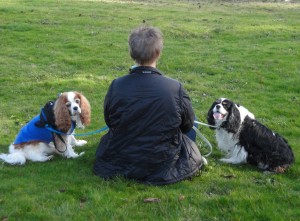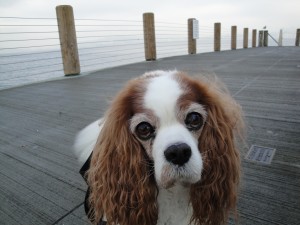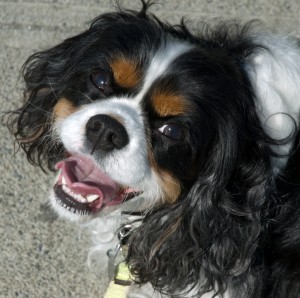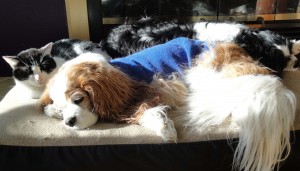 They avoid you, the people you know: friends, family, the medical professionals. They can’t help it. The “C” word is in the air.
They avoid you, the people you know: friends, family, the medical professionals. They can’t help it. The “C” word is in the air.
They just plain look at you differently when there’s cancer in the family. Even if they only think there is. Because they know it means death.
I noticed it the first time when I stopped in at the animal hospital to pick up a report on Murphy’s x-ray. I had first taken her in because she was coughing, and several days later I demanded an x-ray. I thought she needed heart medication. It was bronchitis.
And a tumor on her spleen. Pretty much a death sentence.
So the first time I took her in, it was friendly, happy, open. Murphy is a Cavalier King Charles Spaniel, and at the time didn’t really look her age, a grand almost 13-1/2. She wins fans just because she’s gorgeous, but her charming, curious personality wins more.
Then the vet called with the radiology report.
Later that day, I stopped in to pick up the report. I wanted to hold it in my hand and try to make sense out of getting my dog on antibiotics for an infection and ending up with a terminal diagnosis. For something I didn’t even know was there.
The receptionist looked up with a smile when I walked in. Then her face changed and she looked away.
She flinched.
When other people hear the news, same thing happens.
They flinch.
They don’t mean to. It just happens. Even when it’s their job to give you the really bad news—that someone you love is dying.
They flinch.
I know some cultures—and here I’m thinking of my Japanese friends—who refuse to acknowledge death with the dying person. Instead, the family steps in, handles all the care, including putting the person into a nursing facility, and they never tell the person what’s going on.
The dying people are just expected to know. I guess in their culture, silence means death. So they do know.
I think that’s completely wrong, and I’ll never stop saying it.
My Japanese friends say, “But we wouldn’t want to know.”
But you do know, because you’re clearly failing and no one is talking to you about it. So you can’t talk. You’re left to face the fear, and the end, with distant politeness.
My personal experience says that’s cruel.
I was 9 the day my parents told me that my brother “had gone to heaven.” It took a minute for it to register. I knew he was sick, I didn’t know he was dying. Granted, they didn’t have a lot of time with leukemia back then, but everyone else knew he was dying.
If I’d known, I would have had a chance to say goodbye.
He would have had a chance to say goodbye.
No, they never told him. But I remember the last time I saw him, and the look in his eye as he reached out to hold my hand.
They never told him, but he knew. I am still haunted by what I think he felt: fear, loneliness, grief, anger, confusion. Abandoned.
And now to Murphy. Granted, she’s a dog. However, I believe in the equality of all life, whatever it is. So in my multi-species family the human-animal bond means that my animals are family members.
They are not pets. They are living beings, amazing souls who have the freedom to choose their life’s path. Equals.
They have a right to know what’s happening: from where I’m going when I leave them at home to what’s happening to their bodies.
They have a right to choose their course.
Murphy has chosen hers, and, forced to make my own choice about her condition, I did. We are united. No surgery. Quality time.
We see the world through a different lens now. We see it with our eyes and hearts open, knowing Murphy’s time is limited. It’s heartbreaking and exhilarating: we know what’s coming, and we can share it. But it’s still death.
We’re pretty sure, at our house, that it’s old age that will get to Murphy faster than the tumor. In just the last month the bronchial issues have slowed her down, she’s tired, she’s sway-backed with the tell-tale old dog ribs. Time was at a standstill for a bit, like the ocean receding before the tsunami.
But the tsunami always comes ashore. Ours is almost here. We can see it.
To some cultures, dying is a silent process.
To ours, the patchwork American culture, dying is at least a bit more respectful. The dying usually know. They get to choose. Sometimes.
Murphy got to choose.
But Americans still flinch.
It’s time in our culture to stop flinching. To stop ignoring the inevitable. To embrace death as the place where you leave one life and go on to another.
We need to acknowledge it. Yes, it’s awkward. It’s painful. It’s an ugly reminder that we are all going to die.
It’s life.
Death is what happens. Community can make it something else: a time to celebrate a life, to say goodbye, to cherish the ones leaving and the ones left behind.
Community means you don’t flinch.
Where is ours?
© 2012 Robyn M Fritz
 The human-animal bond is a strange and wonderful thing. Living a multi-species family life is both inspiring and terrifying: every day you should be realizing that it’s one less day, not one more, but you don’t. You can’t.
The human-animal bond is a strange and wonderful thing. Living a multi-species family life is both inspiring and terrifying: every day you should be realizing that it’s one less day, not one more, but you don’t. You can’t. Every January people think about New Year’s resolutions. I never did get that, maybe because I think of life as a choice, and I’m glad I get them.
Every January people think about New Year’s resolutions. I never did get that, maybe because I think of life as a choice, and I’m glad I get them.  But we now know that Murphy’s journey is ending. She has a tumor on her spleen, and there are no easy choices. Remove her spleen and she may live, a few weeks or years, we don’t know. But if it’s a bruise or a tumor that is the spleen’s own way of dealing with a lifelong platelet disorder, maybe, just maybe, surgery is not the answer. And right now it isn’t, anyway, because this all started because she had a mild cough and UTI, and she has an infection to beat first.
But we now know that Murphy’s journey is ending. She has a tumor on her spleen, and there are no easy choices. Remove her spleen and she may live, a few weeks or years, we don’t know. But if it’s a bruise or a tumor that is the spleen’s own way of dealing with a lifelong platelet disorder, maybe, just maybe, surgery is not the answer. And right now it isn’t, anyway, because this all started because she had a mild cough and UTI, and she has an infection to beat first.  Living with anyone, especially yourself, can be irritating. You have grand illusions about being saintly, or at least perfect, but reality doesn’t seem to work like that.
Living with anyone, especially yourself, can be irritating. You have grand illusions about being saintly, or at least perfect, but reality doesn’t seem to work like that. I was thinking, what should I be grateful for this Thanksgiving? Then I saw this silly article, again, and I knew.
I was thinking, what should I be grateful for this Thanksgiving? Then I saw this silly article, again, and I knew.